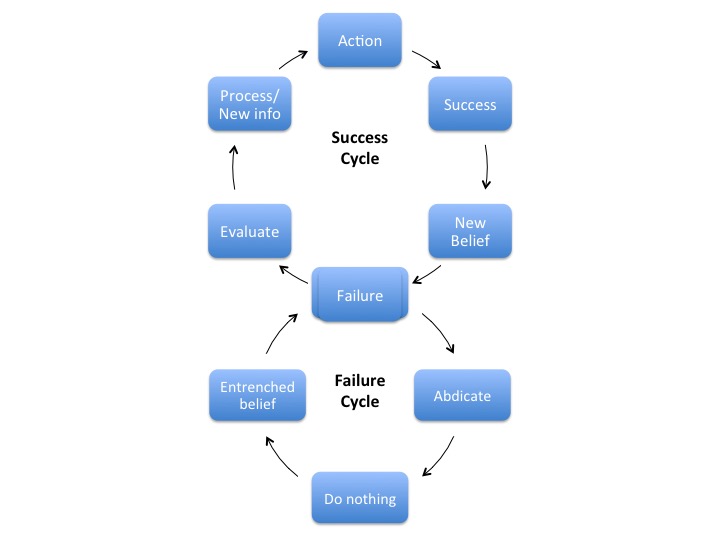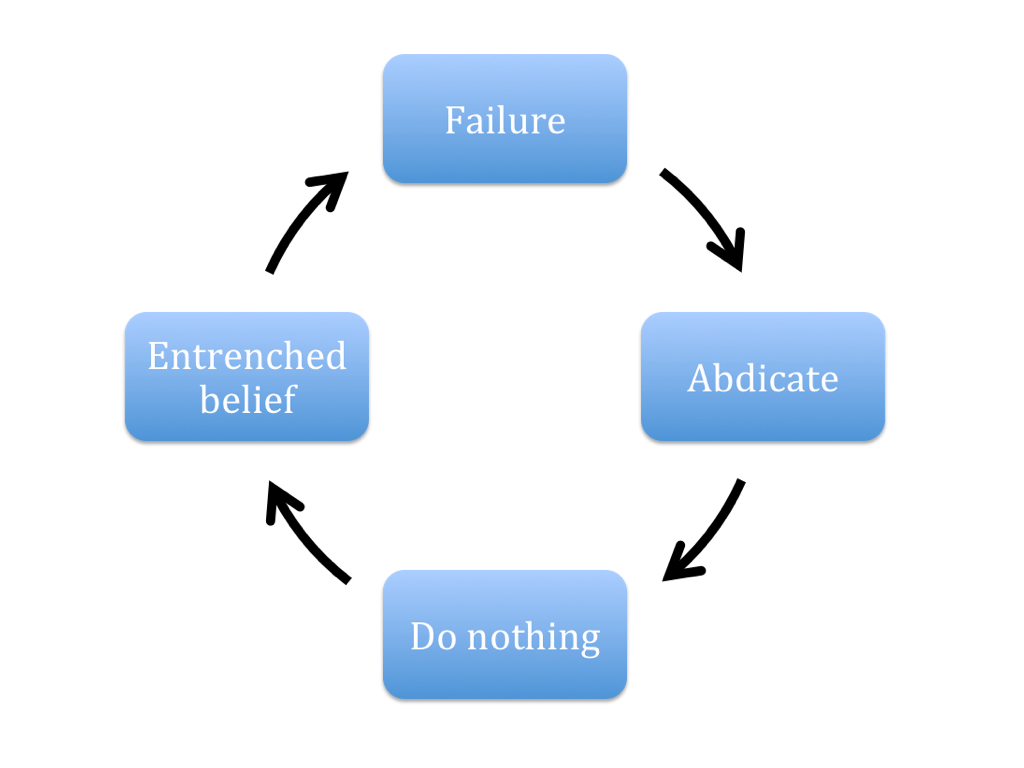Blog Posts
The Success Cycle
 I’ve started to achieve success in different areas of my life that previously I was too scared to try because I’d failed in the past. As I started to look at the processes that helped me to break free from this, I discovered a framework. If I’ve used this framework to get results that I’ve wanted, well, then maybe it will help you discover your own framework or process to get the results you want.
One reason that we don’t achieve the success we desire is because the success cycle is more difficult. Why? Because it takes discipline. Rory Vaden talks about this in his book, “Take the Stairs.” In our culture of microwaves and “get-rich-quick” schemes, it’s no wonder that the people who achieve success and understand their purpose in life are considered by many to be “lucky.”
I believe that the success cycle is very closely tied to the sanctification process that God works in us to produce good fruit for His glory. I believe that our life challenges are designed by God to get us to move in a direction that makes us more like Him. One problem is that when we fail, we often allow negative emotions and thinking to box us in and keep us from moving forward in becoming more like Him. To break this, you must get out of the failure cycle and begin to process your failures differently. You must see them as God’s work to make you more like Him. In which case, you must keep on trying.
So, let’s examine the success cycle. When you fail, the first thing you need to do is evaluate it. Why did you fail? How did you fail? As you answer these questions, ask more questions with growing specificity.
The second thing is to process the answers to your questions and also to seek new information. If you’ve failed at work somehow, find books, or do a simple search online and begin gaining information pertinent to your issue. Or, find someone who is going through or has gone through a similar situation and get his/her advice.
Third, once you have more information and a better perspective on the failure, take action based on your new evaluation and information.
Fourth, this action will either result in another failure, or it will result in a success. If you fail, then keep repeating the steps. However, if you succeed then it results in a new belief that it is possible to succeed.
I have found that the battle is in our thinking and emotions. The sooner we discipline ourselves to manage those two things according to God’s ways, then we will begin to experience the success God has for us in our lives.
I’ve started to achieve success in different areas of my life that previously I was too scared to try because I’d failed in the past. As I started to look at the processes that helped me to break free from this, I discovered a framework. If I’ve used this framework to get results that I’ve wanted, well, then maybe it will help you discover your own framework or process to get the results you want.
One reason that we don’t achieve the success we desire is because the success cycle is more difficult. Why? Because it takes discipline. Rory Vaden talks about this in his book, “Take the Stairs.” In our culture of microwaves and “get-rich-quick” schemes, it’s no wonder that the people who achieve success and understand their purpose in life are considered by many to be “lucky.”
I believe that the success cycle is very closely tied to the sanctification process that God works in us to produce good fruit for His glory. I believe that our life challenges are designed by God to get us to move in a direction that makes us more like Him. One problem is that when we fail, we often allow negative emotions and thinking to box us in and keep us from moving forward in becoming more like Him. To break this, you must get out of the failure cycle and begin to process your failures differently. You must see them as God’s work to make you more like Him. In which case, you must keep on trying.
So, let’s examine the success cycle. When you fail, the first thing you need to do is evaluate it. Why did you fail? How did you fail? As you answer these questions, ask more questions with growing specificity.
The second thing is to process the answers to your questions and also to seek new information. If you’ve failed at work somehow, find books, or do a simple search online and begin gaining information pertinent to your issue. Or, find someone who is going through or has gone through a similar situation and get his/her advice.
Third, once you have more information and a better perspective on the failure, take action based on your new evaluation and information.
Fourth, this action will either result in another failure, or it will result in a success. If you fail, then keep repeating the steps. However, if you succeed then it results in a new belief that it is possible to succeed.
I have found that the battle is in our thinking and emotions. The sooner we discipline ourselves to manage those two things according to God’s ways, then we will begin to experience the success God has for us in our lives.
How You Might Be Failing if You’re a Leader
If you’re a leader, you must take responsibility for what you can influence. To the extent that you don’t, you’re causing other people to fail.
One way you can tell if you’re failing as a leader is if you’re blaming other people under you for your failures. This will probably sound something like this: “If those people were more motivated, we’d be winning.” “My hands are tied because of the incompetent people I have to deal with.” “I’m not going to associate myself with the sales department because I don’t want to be held responsible for missing the goal.”
Your job as a leader is to create an environment where people succeed, whether it’s in your marriage or your team at work. If you allow mediocrity to live where you have influence, then you cannot blame the people you’ve put in place there. The only person you can blame is yourself for allowing it to continue. You are the one who causes change. If you’re not succeeding or progressing towards your desired goal, don’t blame your circumstances or those around you. Take responsibility by acknowledging you can cause change. If you don’t know what to do, you can go find someone who has more experience and get his/her knowledge. If your team is not trained, you can get them the training they need.
Your team is a reflection of how strong a leader you are. If you want to be stronger, you must follow those leaders who are stronger than you. You must also take ownership for your sphere of responsibility and not blame people or circumstances.
The Failure Cycle (Cont.)
Failure Cycle Pic (PDF Download)
Failure
Too often, the fear of failure boxes us in.
“What if they don’t like me?” “What if I’m not good enough?” “What if I screw this project up?” “What if this isn’t God’s will?” “Why is this happening to me?” “What if they don’t like what I have to say?” “What if this hurts?”
The difficulty is stepping out and dancing with the fear, because to some extent, everyone has a fear and there will always be the fear of the unknown.
Understand that staying inside the box is easy and comfortable, but that is all you’ll ever have, the box. While those brave enough to confront the fear, get to dance wherever they choose.
